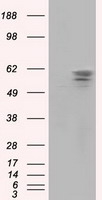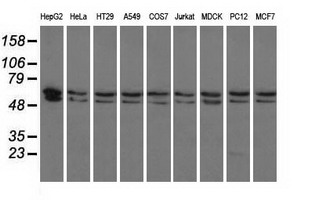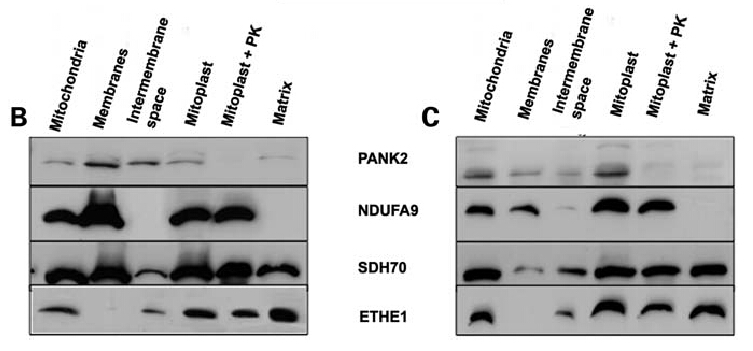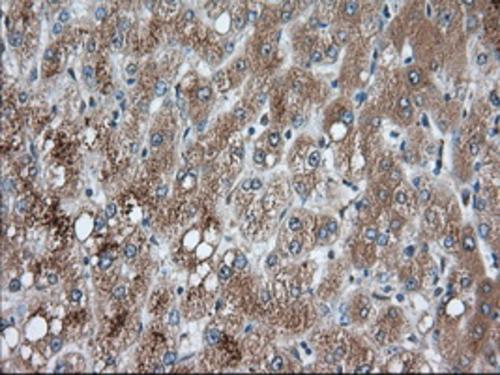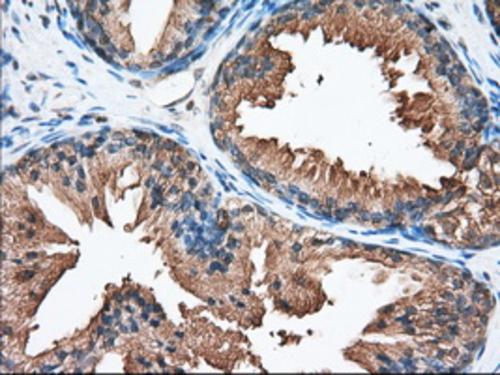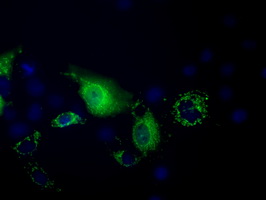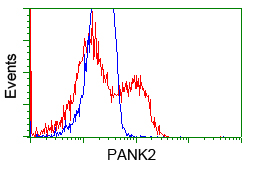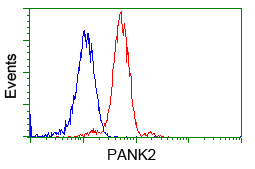PANK2 Mouse Monoclonal Antibody [Clone ID: OTI3H9]
CAT#: TA501321
Anti-PANK2 mouse monoclonal antibody, clone OTI3H9 (formerly 3H9)
Size: 30 ul
Formulation: Carrier-Free
View other "OTI3H9" antibodies (4)
Need it in bulk or conjugated?
Get a free quote
CNY 1,999.00
CNY 2,700.00
| Cited in 5 publications. |
CNY 4,840.00
CNY 300.00
CNY 1,430.00
CNY 2,900.00
CNY 6,650.00
CNY 9,998.00
Specifications
| Product Data | |
| Clone Name | OTI3H9 |
| Applications | FC, IF, IHC, WB |
| Recommend Dilution | WB 1:1000~2000, IHC 1:50, IF 1:100, FLOW 1:100 |
| Reactivity | Human, Dog, Rat, Monkey, Mouse |
| Host | Mouse |
| Clonality | Monoclonal |
| Immunogen | Full length human recombinant protein of human PANK2(NP_705902) produced in HEK293T cell. |
| Formulation | PBS (pH 7.3) containing 1% BSA, 50% glycerol and 0.02% sodium azide. |
| Concentration | 1 mg/ml |
| Purification | Purified from mouse ascites fluids or tissue culture supernatant by affinity chromatography (protein A/G) |
| Conjugation | Unconjugated |
| Storage Condition | Store at -20°C as received. |
| Predicted Protein Size | 59.1 kDa |
| Gene Name | pantothenate kinase 2 |
| Database Link | |
| Background | This gene encodes a protein belonging to the pantothenate kinase family and is the only member of that family to be expressed in mitochondria. Pantothenate kinase is a key regulatory enzyme in the biosynthesis of coenzyme A (CoA) in bacteria and mammalian cells. It catalyzes the first committed step in the universal biosynthetic pathway leading to CoA and is itself subject to regulation through feedback inhibition by acyl CoA species. Mutations in this gene are associated with HARP syndrome and pantothenate kinase-associated neurodegeneration (PKAN), formerly Hallervorden-Spatz syndrome. Alternative splicing, involving the use of alternate first exons, results in multiple transcripts encoding different isoforms. [provided by RefSeq] |
| Synonyms | C20orf48; HARP; HSS; NBIA1; PKAN |
| Reference Data | |
| Protein Families | Druggable Genome |
| Protein Pathways | Metabolic pathways, Pantothenate and CoA biosynthesis |
Citations (5)
| The use of this Antibodies has been cited in the following citations: |
|---|
|
CoA-dependent activation of mitochondrial acyl carrier protein links four neurodegenerative diseases
,Lambrechts, RA;Schepers, H;Yu, Y;van der Zwaag, M;Autio, KJ;Vieira-Lara, MA;Bakker, BM;Tijssen, MA;Hayflick, SJ;Grzeschik, NA;Sibon, OC;,
EMBO Mol Med
,PubMed ID 31701655
[PANK2]
|
|
Silencing of pantothenate kinase 2 reduces endothelial cell angiogenesis
,Pagani, F;Trivedi, A;Khatri, D;Zizioli, D;Garrafa, E;Mitola, S;Finazzi, D;,
Mol Med Rep
,PubMed ID 30221726
[PANK2]
|
|
Overexpression of Human Mutant PANK2 Proteins Affects Development and Motor Behavior of Zebrafish Embryos
,Khatri, D;Zizioli, D;Trivedi, A;Borsani, G;Monti, E;Finazzi, D;,
Neuromolecular Med.
,PubMed ID 30141000
[PANK2]
|
|
Mitochondrial iron and energetic dysfunction distinguish fibroblasts and induced neurons from pantothenate kinase-associated neurodegeneration patients
,Santambrogio, P;Dusi, S;Guaraldo, M;Rotundo, LI;Broccoli, V;Garavaglia, B;Tiranti, V;Levi, S;,
Neurobiol. Dis.
,PubMed ID 25836419
[PANK2]
|
|
Pantothenate kinase-associated neurodegeneration: altered mitochondria membrane potential and defective respiration in Pank2 knock-out mouse model
,Dario Brunetti, Sabrina Dusi, Michela Morbin, Andrea Uggetti, Fabio Moda, Ilaria D'Amato, Carla Giordano, Giulia d'Amati, Anna Cozzi, Sonia Levi, Susan Hayflick, and Valeria Tiranti,
Hum. Mol. Genet., Dec 2012; 21: 5294 - 5305.
,PubMed ID 22983956
[PANK2]
|
Documents
| Product Manuals |
| FAQs |
| SDS |
Resources
| 抗体相关资料 |
Other Versions
| SKU | Description | Size | Price |
|---|---|---|---|
| CF501321 | Carrier-free (BSA/glycerol-free) PANK2 mouse monoclonal antibody, clone OTI3H9 (formerly 3H9) |
CNY 3,999.00 |
|
| TA501321AM | PANK2 mouse monoclonal antibody, clone 3H9, Biotinylated |
CNY 3,990.00 |
|
| TA501321BM | PANK2 mouse monoclonal antibody, clone 3H9, HRP conjugated |
CNY 3,990.00 |
|
| TA501321S | Anti-PANK2 mouse monoclonal antibody, clone OTI3H9 (formerly 3H9) |
CNY 800.00 |


 United States
United States
 Germany
Germany
 Japan
Japan
 United Kingdom
United Kingdom
 China
China

